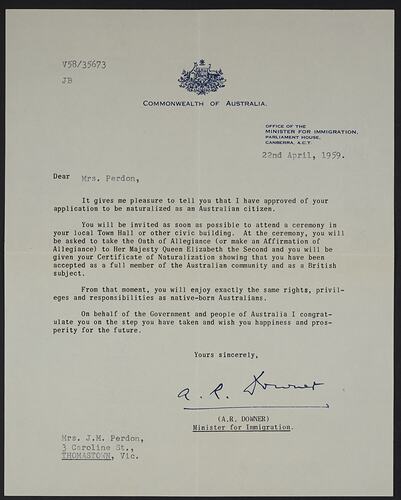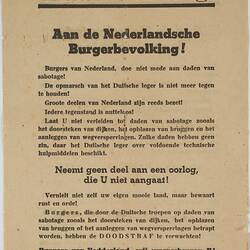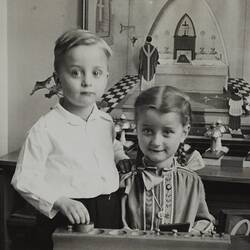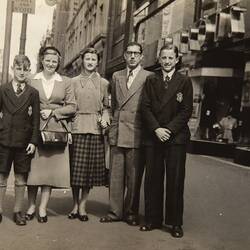Summary
Letter on Commonwealth of Australia letterhead from A.R. Downer, Minister for Immigration to Johanna Perdon, Thomastown, Melbourne, informing her that her application for naturalization as an Australian citizen has been approved. The letter is dated 22 April, 1959. The letter provides details about the forthcoming citizenship ceremony.
This item belonged to Johanna and Theodorus Perdon who migrated to Australia from the Netherlands in 1952 with their three children Ricky (Hendrika), Bill (Wilhelmus) and Theo (Theodorus). They had survived terrible conditions in the Netherlands during World War II under German bombing and occupation. Johanna chose Australia as she reasoned Canada would be too cold and she did not support apartheid in South Africa. They left from Rotterdam and arrived at Station Pier, Port Melbourne on the Fairsea on 7 October 1952. The family first lived in Keon Park on a farm owned by Elsie and Alex McDonald and 18 months later moved into a bungalow they built in Thomastown. Johanna (a multilingual bookeeper) first worked in a factory in Collingwood making headlights for cars and bikes and Theodorus (a barber by trade) first worked for a barber before opening his own business in Exhibition Street Melbourne for many years. The three children attended Catholic schools in Northcote, Clifton Hill and Reservoir.
This item is part of a collection of documents and photographs relating to the Perdon family who lived through the occupation of the Netherlands (in Rotterdam and The Hague) during World War II. The family subsequently migrated to Australia in 1952. The documents document German propaganda, rationing, property destruction due to bombing, and resistance warnings issued; as well as some immigration process documents and Henrika's school reports from the Netherlands. Many of the wartime items had been well hidden; if discovered the family would have been charged with holding underground propaganda. The photographs portray the family before and immediately after the War in the Netherlands and their early settlement in Melbourne.
Significance
Statement of Historical Significance:
This collection provides a rare opportunity to document and interpret civilian life under German occupation during World War II. Migration-related family narratives tend to commence after the war, focusing on experiences of displacement and the immigration process and journey. This story provides detailed memories of food, housing and heating shortages, the rounding up of young men, bombing raids, danger, mobility and lack of schooling. Consequently, this collection provides valuable insights into the ways in which Dutch civilians were issued with German propaganda, warned against acts of sabotage and resistance, rationing and insurance notices for property loss due to bombing.
More Information
-
Collecting Areas
Migration & Cultural Diversity, Childhood, Home & Community, Images & Image Making, Medicine & Health
-
Issued To
Mrs Johanna A. Perdon, Thomastown, Greater Melbourne, Victoria, Australia, 22 Apr 1959
-
Classification
-
Category
-
Discipline
-
Type of item
-
Keywords
World War II, 1939-1945, Identifications, Dutch Immigration, Dutch Communities, Propaganda, Civilian, Immigration, Children, Childhood, Families, Shipboard Travel, Education, School Uniforms, School Children, Healthcare & Medicine, Newspapers, Citizenship



